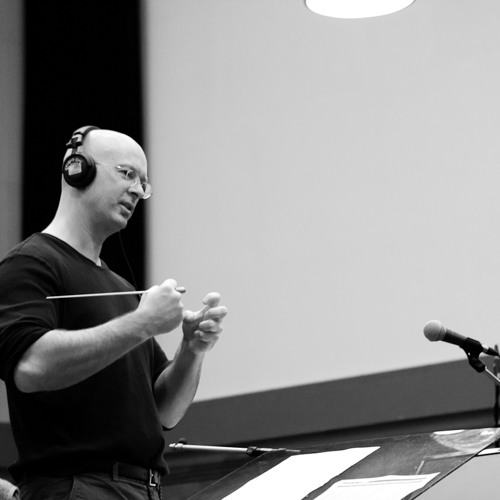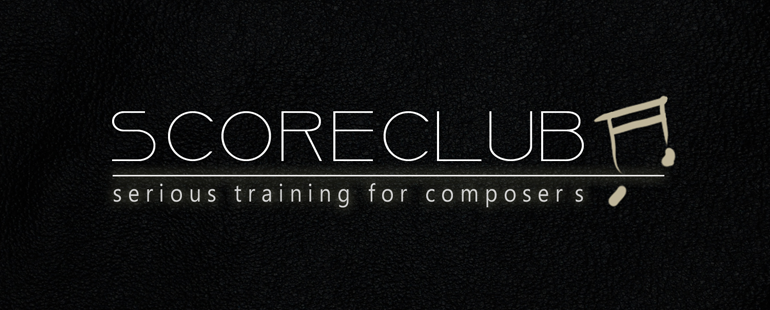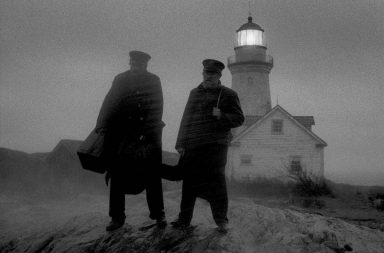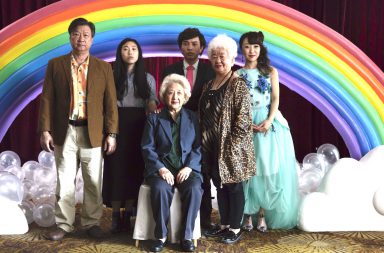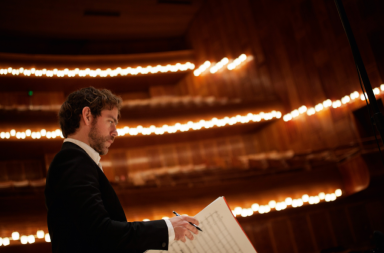Canadian composer Alain Mayrand has been navigating between Hollywood blockbusters, indie films and TV shows, acting as composer, conductor or orchestrator for more than a decade now. He has been switching between live action and animation films and jumping from SF to drama and from horror to thrillers with astounding ease. We were lucky enough to Skype-chat with Alain about his work, his rich career and his different projects. The man is enthusiastic, warm and eager to tell you about his passion. His generosity and willingness to share and pass on his love for music is clear but this very hands-on composer has also set up an on-line class for aspiring composers. He tells Score It everything.
Score It: Alain, you have have an incredibly eclectic career, as a trained musician and as a composer in residence with the Vancouver Metropolitan Orchestra. Your music is performed in Europe, Asia, as well as North America and you are also a film orchestrator, conductor and composer. How and when did you start in the film industry?
Alain Mayrand: I started in the film industry when I graduated. I did a Masters in Classical Music, composition. Once I graduated I started getting interested in film scoring. I pursued my classical and film careers at the same time at that point, trying to get short films and getting my name out. After that, I did take a hiatus for a few years from film scoring and focused on classical. I really got into film scoring again in 2010.
What is the difference between a film conductor and a film orchestrator? How do you collaborate with the composer when you’re in charge of conducting and orchestrating?
AM: Well so far, I’ve only conducted things I’ve orchestrated but sometimes, you need just the conductor and you can orchestrate. That does happen. What happens with me is I’ll get MIDI files and audio tracks from the composer —usually his assistant or somebody that cleans it up. From there, I look at what the audio tracks are doing in order to see if it’s possible to do it with live musicians. So during that process I get to know the music. I make mental notes of what I want to do and how I want to have the musicians during the recording session. That involves cueing or transmitting the feel of the music so the musicians understand very quickly what they have to do.
Source: Vancouver Metropolitan Orchestra
You have two upcoming projects with director Stephen Wallis: Ripper Society and The Performance. How did you get involved on these projects? Did you know Stephen before-hand?
AM: Well this is the magic of the internet.
How come?
AM: Well, with Stephen, we got in touch through Facebook.
Really?
AM: Oh yeah, and this has happened quite a few times now.
I didn’t realise this would happen in the film industry, it’s quite interesting.
AM: With Facebook, I find there is sort of a friendly atmosphere. I’ve made friendships that way and then we meet.
It’s just more casual I guess.
AM: It’s a friendly place: you message each other and keep in touch. You see what they’re doing, thinking and writing. Really, it’s a great place for that.
When it comes to composers, you hire someone if you like their music. You’re going to listen to music and say ‘Well, I have aesthetic ideals for what the film score should be.’ Some of them will take a leap some won’t. They might hear a score that you’ve done and think; ‘he’s got talent even if it’s not what I envisaged.’ Some directors will just say ‘that’s the music I want for my film’ but if they don’t hear anything real they’re not going to take a chance. It’s a risk for them at that point because you’re coming to the end of the production process. What I’ve found, if they have a feeling of friendship, if they know you and you seem like a good guy, it’s very conducive to business.
Which stage of production are you at with these films? Have you started working on them yet?
AM: I’ll be completing the recordings for The Performance pretty soon. There was a bit of a break on it. Some technical issues but it’s all fixed now. The Ripper Society is in the future. It’s been cast but it’s a long process putting a film together. Because things went so well with Stephen and I on The Performance, he put me on that one right away. As soon as we started working together he loved the process and just said ‘You’re on everything I do.’
How do you usually work? Is the script enough for you to get cracking or do you prefer to wait for the early cuts?
AM: That’s a tricky question because the script can be misleading.
In what way?
AM: You rely on your own interpretation when you read a screenplay, just like when you read a book. Then you finally see the movie and are like ‘No, that’s not that I was thinking at all, that doesn’t work, that’s no good.’ It’s not the same medium. A case in point is The Performance, I remember reading it and thinking ‘this is good, I really like it’ and then seeing the film and going ‘Holy crap, this is excellent’. The actors, the cinematography, the pacing, what an actor brings to a line… Their point of view changes everything.
Also colours in the cinematography, not just the framing, the colours they choose, it’s gigantic in decisions you make in your score. On top of that, when they start editing the film, it’s another part that can really change the film. My experience has been that I can write stuff to the script —and I have done so— but it’s been really rare that I’ve kept anything when I do that. I think the only time was when I did The Legend of Silk Boy.
Do you have a scoring routine? Do you have a preferred instrument that you go to when you start working on something or does it just depend?
AM: It will depend. I don’t touch anything if I can. What I found is that I can get a certain distance that way and it becomes clearer and clearer in my head. If I start touching things, it’s funny, it’s almost like you’re reacting to the sound you hear rather than making it up. I know the piano, so my piano skills are what I’d call composer piano and that’s serviceable for me. It’s very messy if you were to hear when I compose using the piano. It‘s just noisy playing, holes when I am imagining things and me humming like a crazy person. It’s a mixture of those three, manifesting the sound that way. But I do like to go first in my head and then if it’s pretty clear I’ll start writing it down.
Do you try watching the images at the same or do you keep it in your head?
AM: Yeah, I like to start playing with the images and I start feeling like I need to hear something. I just play a chord or two, or a few notes. It’s almost like it gets me back inside my head.
You have scored many films belonging to different genres: animation films —The Legend of Silk Boy, which you talked about earlier, White Tiger Legend—, dramas —No Letting Go, The Performance—, thrillers —Primary, Numb—, etc. Do you have a certain affinity for a particular genre? Would you say that there is a genre that is easier to score?
AM: Oh my goodness. You know, the funny thing is, technically and musically, doing an animation is much more difficult because technically you have so many hits to hit and it’s more complex musically. There’s a lot more advanced techniques to the writing, but also the tone is simpler. But I’m over simplifying because I do remember looking for the main titles for quite a while. Giving an identity to the music that fits the drama is a challenge but it’s also a lot of fun. With Numb I’m trying to tell a part of the story that may not be on screen and that gives information to the spectator. With animation it’s pretty much what’s on the screen. Whereas with something like Numb there’s a lot of subtext to it, so that’s the challenge.
I had a real affinity with animation, but honestly I’m in love with all the films I’ve worked on. It’s not like I prefer animation over something else. It is a tricky one because it’s fun to have variety and bring in different aspects of my musical personality; we don’t watch just one type of movie and it’s the same for writing.
You’ve worked on blockbusters like Elysium and Ender’s Game and you’ve also worked on more independent films. How do these two experiences compare?
AM: On the blockbusters I was orchestrator. When I worked on Elysium, it was an unusual situation because of the composer being used was completely untested. So I was actually there in the office with the composer, and the music editor and the whole post-production team.
For Ender’s Game I was hired by Penka (Kouneva) and I just did some extra cues, it was just orchestration. and In that sense, it was different from the composer’s point of view as they are the ones that have to deal with, on bigger films, a lot of constant changes to the edits, lots of cooks in the kitchen. Whereas when you work on an indie film, from a composing point of view, you have a narrower chain of command: just you and the director. Not to say that doesn’t happen on big films, but I didn’t work as a composer on a big film.
You have an additional string to you bow. You are a teacher and you created Score Club, can you tell us more about it? What was the idea behind the online classes for young composers?
AM: I’ve been teaching for a while and interestingly it was something I didn’t think I would like or love as much as I do.
Are you physically teaching in a school or university or is it just online classes?
AM: I did do that. But when things started getting busier, I needed to be flexible. Before teaching online I didn’t teach composition specifically, I enjoyed teaching piano and guitar and theory and all that, and I did that for a while—ten years. But then I just wanted to teach composition. It’s very gratifying, surprisingly so. I would hate that all the effort I have put in to learn… I just want to pass it on.
There’s times I’m really busy and sometimes I’m less busy, so I teach more. But the online classes get expensive and not everyone can afford it. I saw this thing called the Khan Academy that my two sons were doing and this online way of teaching really just struck a chord with me. It’s a little bit of information, very concise and to the point. There was this map of all the courses and how they’re related and it started to grow. My students would always say ‘you need to record these lessons more you need to do it’. It’s the feeling I started to get from teaching, from what my students would say and then from this Khan Academy that showed me a way that had never really been done for composition.
Do you have any tips for young composers just starting out?
AM: Well first I’ll give the same tip that Jerry Goldsmith would say which is ‘learn to compose.’ The technical parts are easy, composing is hard, so learn. If you want to be like the greats you need to do what they did. It’s training. I believe completely, whole-heartedly, (I would even want to take the belief out of it because I am sure of it); training builds your creative strength. The depth of your ideas is reliant on what you know, there’s just no other way around it.
After that I would say build relationships because they need to trust you. If there’s no trust it won’t work. So stay in touch with people, make it part of what you do, do it so it fits your personality. If you like going to events, do that, if you prefer doing it some other way, do it some other way.
So are social networks part of it for you?
AM: That’s right, like so many jobs right now. The majority. It’s funny, I don’t work locally very much.
Who do you find inspiring in the film music industry today? Is there one composer that you’re a really big fan of?
AM: John Williams, there’s no way around it. He seriously works on a level that people underestimate. He has the ability to really add soul to a picture. The pacing of his music in the film, his palette is so big, so varied… He is not complacent, he doesn’t keep doing the same thing. Yeah, that’s my hero worship, there’s no doubt. James Horner, Jerry Goldsmith… I would say John Powell and James Newton-Howard as well.
So, do you have a personal favourite score for 2016 yet?
AM: For this year? No… What have I even seen this year. Just name a few scores because I think there might have been something I noticed but I’m trying to remember.
I really liked Ryuichi Sakamoto’s score for The Revenant.
AM: I haven’t heard the score or seen the movie yet. I’ve been wanting to do that.
I did not really enjoy the film but the score is amazing, you can listen to it on its own, it’s so atmospheric. There is something in it, it’s so cold.
AM: OK, well, I’m going to have to check it out for sure!
***
A massive thank you to Alain for his time!
Interview prepared, conducted, transcribed and edited by Marine Wong Kwok Chuen and Genevieve Stow
